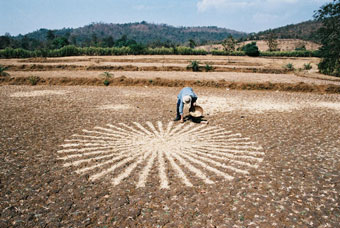

|
William
James Müller (1812-1845) was born in Bristol, his
father a Prussian émigré, his mother a Bristolian.
He served as an apprentice to the Bristol artist James Baker
Pyne from whom he developed his skill as a draughtsman, specialising
in landscapes.
William Müller (detail
from Some Who Have Made Bristol Famous). |
He travelled through Europe in the mid-1830s,
sketching views, and in 1838 he became one of the first British
artists to tour Egypt. He was particularly adept at capturing
scenes of the Nile and the desert, though his drawings and watercolours
were considered better than his rather awkward oil paintings.
There are a number of his works in Bristol's City Museum and
Art Gallery.

The Burning of the Bishop's
Place by W J Müller, c 1831
(Bristol's Museums, Galleries and Archives). This is a scene
during the Bristol Riots.
Others associated
with art and design, and with Bristol include:
Nicolas Pocock
(1740-1821), maritime painter and founder member of
the Society of Painters in Water Colours.
Sir Thomas Lawrence (1769-1830), portrait painter and President
of the Royal Academy.
Ellen Sharples (1769-1849), one of the founders of the Royal
West of England Academy.
Edward Bird (1772-1819), known for his paintings of domestic
life.
Francis Greenaway (1777-1837), architect sentenced to transportation
for life at Bristol assizes for forgery.
Samuel Colman (1780-1845), painter of dramatic canvases of symbolic
catastrophes.
Edward Hodges Baily (1788-1867), sculptor of the statue of Nelson
in Trafalgar Square.
Francis Danby (1793-1861), arguably the most accomplished of the Bristol school
of painters.
Rolinda Sharples (1793-1838), one of the first women artists
to tackle crowd scenes.

Clifton Race Course (detail) by Rolinda
Sharples, 1836 (Bristol's Museums, Galleries and Archives).
Samuel Jackson (1794-1869), painter
who worked with Isambard Kingdom Brunel.
Philippa Bethell (b1816), Clifton-based artist and tutor.
E W Godwin (1833-1866), architect and designer.
Frederick Bligh Bond (1864-1945), architect and archaeologist.
Paule Vézelay (formerly Marjorie Agnes Williams) (1892-1984),
abstract artist.
Gwendoline Cross (1896-1966), First President of the New Bristol
Art Club.
Jeremy Rees (1937-2003), founder of Arnolfini arts centre.

Richard
Long making Paddy-Field Chaff Circle in India, 2003, photograph
from the Richard
Long website.
Richard Long, environmental artist.
Martin Parr, photographer.

Sold Down the River by Tony Forbes,
1999 (Bristol's Museums, Galleries and Archives).
Tony Forbes, artist.
Banksy, stencil graffiti artist now sought out by galleries and
collectors.

Banksy artwork on the Sexual Health Clinic in Frogmore
Street, Bristol.
|